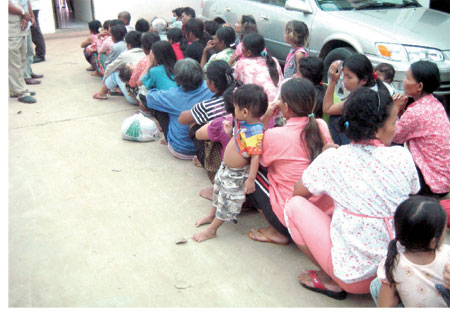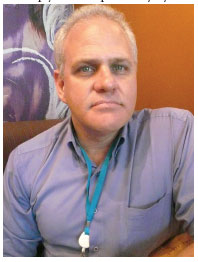From boardroom battles to beating slavery
Updated: 2011-03-02 07:47
By Simon Parry.(HK Edition)
|
|||||||||
|
Trafficking victims are saved by raids on sweatshop factories in Cambodia. Photos Provided by Red Door News, Hong Kong |
|
Trafficking victims are saved by raids on sweatshop factories in Cambodia. Photos Provided by Red Door News, Hong Kong |
An estimated 9.5 million people across Asia are victims of human traffickers. Now a United Nations team is enlisting wealthy professionals from Hong Kong to help tackle the misery of modern-day slavery and sexual exploitation, reports Simon Parry.
By day, they are among Hong Kong's most high-powered professionals - bankers, accountants, lawyers and telecom professionals who command stratospheric salaries and look out at Victoria Harbour from boardrooms high in the city's most imposing skyscrapers.
Outside office hours, however, they have a very different mission. They're preparing to become secret agents who will use their expertise, their contacts, their resources and their brainpower to fight the scourge of human trafficking which claims millions of victims across Asia.
The wretched lives of the trafficked people the "city slickers" have pledged to help could hardly be more different than their own. But already dozens of executives have agreed to use their considerable influence to combat an evil that destroys lives across the region.
These necessarily anonymous executives are the first members of the Mekong Club - a newly formed group set up by a United Nations task force to harness the financial muscle, brain power and expertise of Hong Kong professionals into the war on human trafficking.
At a series of meetings earlier in February, executives from five major legal companies and three telecom companies as well as large financial brokerages pledged support to the project which will provide finance and brain power to help bring traffickers to justice.
When it begins its work in earnest, the Mekong Club is expected to parachute top lawyers in to tackle court cases around the region, to draw on the financial expertise of its members to trace traffickers' cash trails, and to use telecom experts to set up trans-border hotlines for victims.
Working behind a cloak of secrecy to shield them from the potential threat of the powerful gangs who control much of the trafficking around the region, these "city slickers" from Hong Kong will become unlikely crime-fighting avengers.
The novel move to harness their abilities is being led by the United Nations Inter-Agency Project on Human Trafficking (UNIAP) which tackles trafficking in six Mekong countries - China, Thailand Vietnam, Laos, Myanmar and Cambodia.
Since its work began in the region a decade ago, the UNIAP has built close ties with the governments of the Mekong countries to formulate common policies and approaches to tackle trafficking. But the more information that is available, the more daunting the problem can appear.
Every day, thousands of lives are ruined as women and children are trafficked across Asia's borders to work in the sex trade or into domestic slavery and men are trafficked to work in sweat shops or ships where they are forced to work sometimes for years.
The UNIAP's work has helped build a clearer understanding of the methods traffickers use, the routes they use and the way they operate, but the sheer scale of the trafficking industry means fighting is a monumental task given the resources available.
Today, an estimated 9.5 million people are victims of trafficking in Asia as part of a global trade reckoned to generate $34 billion a year.
The fight against modern-day slavery and sexual exploitation might seem a million miles from the five-star lifestyles of executives in Hong Kong but the response from big business to the rallying cry has been rapid and positive.
Matthew Friedman, regional project manager for the UNIAP which works closely with other UN agencies including United Nations Children's Fund (UNICEF), the United Nations Development Programme (UNDP) and the International Labour Organization, said the victims' stories had transformed corporate audiences from disinterested observers to enthusiastic activists.
"When you start telling these people the case examples, they get drawn into it and they want to address it," he said. "There are a lot of people in Hong Kong who are successful and have a good job and a good life and they really want to give something back.
"I went to one office and I was sitting down with the private sector people and they pretty much said 'You have 15 minutes'. There was a senior partner there when I first saw him I thought he would be on his Blackberry the whole time.
"Within 10 minutes of hearing some of the stories, he had put his Blackberry away. Within half an hour, he was up to the table. Within 45 minutes, he was leaning forward and saying 'Have you guys thought about this? Have you thought about that? What about this?'
"All of a sudden, this person was so engaged and he had great idea. It was almost like a spark went off. I feel within the private sector there are a huge number of people who want to give something. The concept of the Mekong Club is to see whether we can co-opt that spirit."
Friedman's colleague Lisa Taylor, chief technical specialist for the UNIAP, said it was impossible not to be deeply affected personally by the human situations she had encountered in 15 years or work in the field of trafficking in Asia.
One of her most powerful memories is of a teenage girl trafficking into the sex trade first in Bangkok then in Malaysia from a poor village in northern Thailand at the age of 15 who returned home two years later with AIDS.
"She came home to die," said Taylor. "It was in the mid-1990s and the trafficking phenomenon wasn't understood at that time. There were families with young girls who had no opportunities and they were encouraged to go out and find a good life for themselves.
"It was a tough time. We didn't really understand what was happening at that time and neither did the families of the victims. They just saw their children go away and then coming home to die."
Today, she said, some of the most shocking cases involve whole families trafficked out of Myanmar. "You get traffickers separating the children and women from the men," she said. "The men are sent off in fishing boats. The women go off in another direction for karaoke bars.
"We have a Myanmar speaker in our office in Bangkok to handle calls for help from these people. It is heartbreaking to hear people who are exploited and they have escaped and they are trying to find their spouse."
The opportunity to tackle human trafficking is irresistible for many people, Friedman said. "It is just the right thing to do," he said. "This is about slavery. It is something that is morally repugnant and they want to do something to help.
"It gives people challenge related to humanity. It involves human beings. It is about people in terrible situations in the same world we share. Why wouldn't people want to be involved in that?"
He argued: "To me, it is an issue that is as important as the environment because we are talking about basic human rights, basic human dignity, and the basic human ability to achieve things that we all want out of life - to be treated fairly and justly and not to be exploited."
In its drive to recruit more businesses to the Mekong Club, the UNIAP is working with Robin Hood Asia, a New Zealand-based corporate social responsibility consultancy. Founder and CEO Jude Mannion said the project gave Hong Kong people the chance to be "heroes".
"Human trafficking is a vast criminal problem," she said. "The game has to change if we are going to make any impact on this in our lifetime and that is why we are turning to Hong Kong-based businesses to help."
Hong Kong was an ideal base for the counter-trafficking initiative because of its strategic location at the heart of the Mekong region and the wealth of expertise in areas such as telecommunications, logistics and technology which can be used to combat trafficking.
"These people have the skill to look at how things can be differently and to solve problems," Mannion said. "Their efforts will be heroic - heroic in the eyes of millions of vulnerable people and also in the eyes of the six Mekong governments we work closely with.
"Right now, we need to get started and we're putting our hands up for more help and hoping smart business will see that by applying their skills to this human emergency, they can show the world just how effective taking a business approach can be."
Mannion argued: "This will be an international coup for Hong Kong. It is the first time this request has been made of businesses anywhere in the world and we know the results will show Hong Kong in a proud light."
Friedman said he had already found through his initial meetings in Hong Kong that the perspective of business professionals was entirely different to that of the government officials and aid agencies normally left to deal with trafficking issues.
Hong Kong professionals were bursting with ideas and approaches that might never occur to a civil servant or an NGO executive, he said, and it was logical for trafficking to be tackled by people working in the business world.
"Trafficking happens within the realm of bad business, of rotten business. So who better to address fixing that than the private sector?" Friedman said.
"People in the private sector tend to work with a different kind of accountability and bottom line. They have an efficiency and urgency about them. That kind of insight is instrumentally important to us."
It is an approach that Friedman believes has the potential to make a major difference on the war on trafficking not just in the Mekong region but worldwide. "This offers the possibility of being a model not just for Southeast Asia but for South Asia and for other parts of the world," he said.
"The thing about human trafficking is there are a lot of well meaning people doing different things. The sector needs to be smart in finding the things that work and linking up the right sectors.
"The amount of money generated by human trafficking is estimated at $34 billion a year. The amount of donor support to respond to it is about $300 million. In terms of dealing with something as important as slavery, to have a response so miniscule in terms of the magnitude of the problem is quite concerning."
As Friedman sees it, the war against trafficking is a common responsibility and every available weapon must be commandeered for the battle ahead.
"We want to harness the available mental wealth the financial wealth and contributions corporations can offer to address a problem that belongs to us all," he said.
Anyone wanting to find out more about the Mekong Club and how to support its work should go to www.themekongclub.org
(HK Edition 03/02/2011 page4)

